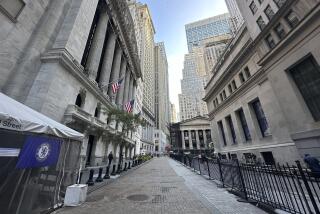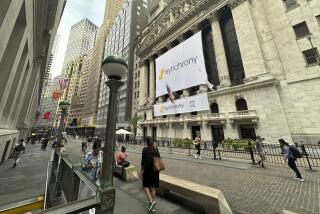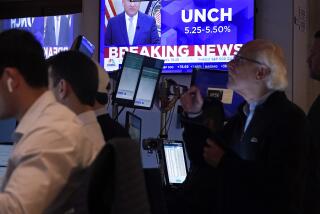Economic Meeting Validates Bush’s Warnings of Recession
AUSTIN, Texas — With a new sense of urgency, President-elect George W. Bush on Wednesday called on Congress to quickly enact his $1.3-trillion tax cut, citing the gloomy portrayals of a troubled economy that were delivered to him by nearly three dozen business leaders.
“A lot of folks in this room have brought some pretty bad news--that their sales are slowing, that they’re having to trim back their work force,” a somber Bush told reporters after the closed-door meeting.
As a result, the president-elect said, “I think we’re going to need to move quickly” to enact the across-the-board tax cut, adding: “And I mean the rates on everybody who pays taxes.
“There is a unanimity here that we need to help spur the economy . . . , that the warning signs are real, that people’s bottom lines are being affected, which hurts the ability for our American citizenry to find work.”
He seemed to leave open the possibility of separating his tax cut proposal into smaller packages if that strategy might expedite congressional enactment.
In response to a question about such an approach, Bush said:
“Well, you’re talking about the tactics there in the halls of Congress. And my preference is that we get the job done. That’s my preference, and whatever it takes to get the full job done is what I support. Obviously, I’d like to see the rates cut. I’d like to see us get rid of the death tax and I’d like to see us do something on the marriage penalty as well. But the main part of the discussion here has been about cutting the rates on people who pay taxes.”
Tax Cut Architect Lindsey Gets Post
In a day dominated by domestic economic developments, Bush also named Lawrence Lindsey, a key advisor during the campaign and a former Federal Reserve governor, as his chief economic advisor. Lindsey will hold the title of assistant to the president.
The 46-year-old economist, the principal architect of Bush’s tax cut proposal, is a veteran of the Ronald Reagan and George Bush administrations. Under Reagan, he served on the staff of the Council of Economic Advisors as senior staff economist for tax policy. Under the elder Bush, he served as special assistant for policy development. From 1991 to 1997, Lindsey was a member of the Board of Governors of the Federal Reserve System.
As Bush and Lindsey met over lunch here with the 35 business executives, word spread that the Federal Reserve had lowered interest rates, a surprise move that delighted everyone in the room--but left most calling for additional rate reductions.
Bush said afterward that he was “pleased” by the Fed’s rate reduction, adding: “I think the cut was needed. It was a strong statement that measures must be taken to make sure our economy does not go into a tailspin.”
He added, however, that a rate cut alone cannot do the job, saying that his tax cut remains an “integral part of economic recovery.”
On that front, the Republican president-elect got some additional good news earlier in the day when top congressional Democrats made a conciliatory gesture on the contentious issue.
House Minority Leader Richard A. Gephardt of Missouri and Senate Democratic Leader Tom Daschle of South Dakota said they could support a bigger tax cut than the roughly $300 billion over 10 years that they supported last year.
While declining to specify a higher figure, Gephardt said: “We’re now looking at larger amounts than that because of the enlarged surplus projections and because of the slowdown in the economy.”
Daschle said that he hopes this olive branch by Democrats will prompt genuine movement to the center by Bush as well.
“Now they can’t hold out their hard position if we’re willing to come halfway,” he said. “I’m hoping that we both can come halfway, and that’s what this is all about.”
But Democrats also indicated that they still intend to fight Bush on the shape of the tax cut, favoring targeted tax cuts such as reducing the estate tax or marriage penalty over an across-the-board rate cut.
Senate Republican Leader Trent Lott of Mississippi said the Democrats’ comments were “positive” but warned that a compromise tax cut in the $500-billion to $600-billion range would be “not nearly enough.”
Bush’s designated White House spokesman, Ari Fleisher, called the comments by Daschle and Gephardt “heartening” and added: “I think it’s more evidence that we can work together in Washington.”
In Austin, Bush’s session with the business executives followed several other meetings in recent weeks with leaders in education, agriculture and faith-based charitable work.
Participants in Wednesday’s meeting said that Bush and Lindsey began by calling on guests, one by one, to describe the economy from their particular vantage point.
Gerry Parsky, head of Aurora Capital in Los Angeles, described Bush’s approach in the meeting this way:
“He didn’t come in and say to us, ‘Here’s what the situation is.’ He asked people around the room, ‘What is the situation in your company? What’s the situation in your industry? What have you seen in the last 90, 120 days?’ He took in information. And I think he was probably surprised at the extent of the news that he got that the economy is slowing and that action is needed.”
A Dire Picture Emerges From Talks
Before long, the dialogue became free-flowing. But the message was undeviating, as each speaker painted a dire picture of the months ahead.
“It was very clear that he [Bush] was not going to back down,” said Steve Forbes, president and CEO of Forbes Inc. and a onetime Republican presidential aspirant.
Lindsey, sitting by Bush’s side, said afterward: “We’ve got some work to do, it sounds like from this morning.”
Jack Faris, president of the National Federation of Independent Business, which represents America’s small businesses, told reporters later: “All indicators say that the economy is slowing in our shop. We’re very concerned with sales down. We’re cutting back on hiring plans.”
Stephen Brobeck, executive director of the Consumer Federation of America, emerged from the session saying that he is now “a little more pessimistic about the short-term economic prospects than I was a couple of hours ago.”
Among those who hailed the Fed action was Forbes, a longtime Fed critic. But, he said, “more rate cuts are needed.”
Jack Welch, head of General Electric, agreed. He also called for additional rate cuts, saying that the benefits of Wednesday’s rate cut would not be felt for “at least a half year.”
If quick action is taken to head off a downturn, said John T. Chambers, president and CEO of Cisco Systems Inc., “perhaps we can turn it around as quickly as in one or two quarters.”
After the business meeting, Bush returned to the Texas Governor’s Mansion to resume packing. Aides said he may make one more quick trip to Washington next week before the inauguration.
Today, Bush plans a similar closed-door meeting, this time with leaders of the high-tech industry.
On Saturday, he is hosting Republican governors at his ranch near Crawford, Texas, about 100 miles north of here.
*
Times staff writer Janet Hook in Washington contributed to this story.
More to Read
Inside the business of entertainment
The Wide Shot brings you news, analysis and insights on everything from streaming wars to production — and what it all means for the future.
You may occasionally receive promotional content from the Los Angeles Times.










